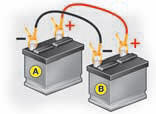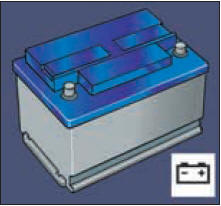Battery
Removal
If the vehicle is fitted with an alarm, this should be deactivated before disconnecting the battery. Disconnect the battery leads, negative lead first.
Refitting
Ensure that the battery is correctly positioned. On certain models, the flange should be midway between the two battery terminals. Reconnect the battery starting with the positive lead first.
Precautions
Ensure that the posts and terminals are clean.
If they become sulphated (white deposit), disconnect and clean them.
Never disconnect the leads while the engine is running.
Never recharge the battery without first disconnecting the battery leads.
Recharging using a battery charger
The voltage must never exceed 15.5 volts and the charging current must never exceed 20 % of the rating marked on the battery casing (for example: 250 A, setting: 50 A maximum). Length of charge: 24 hours maximum. Only battery chargers with a constant, regulated voltage output should be used.
If the vehicle is not in use for a prolonged period
If the vehicle is to be taken out of use for periods of more than one month, the battery should be disconnected.
If a metal object makes a contact between the two battery terminals or between the battery + and the bodywork, this causes a short-circuit (risk of fire and serious burns). The battery releases minute quantities of hydrogen, a gas which is explosive under certain conditions. Never use a flame or create sparks close to the battery. The battery contains dilute sulphuric acid which is highly corrosive:
When handling batteries, always protect your face and especially your eyes.
In the event of any contact with the skin, rinse immediately with copious amounts
of fresh water.
Refer to a CITROËN dealer for battery replacements.
Access to the battery
The battery is located in the engine compartment. For access to it:
- open the bonnet using the interior release lever, then the exterior safety
catch,
- fix the bonnet stay in place,
- remove the plastic cover for access to the two terminals,
- if necessary, unclip the fusebox to remove the battery.
Emergency starting with a slave battery
A vehicle with a discharged battery can be started with either a slave battery or the battery of another vehicle.
A Discharged battery
B Slave battery
It is essential to proceed strictly following the sequence indicated. Check that the emergency battery is correctly charged up (12 volts). If you are using the battery on another vehicle, stop the engine of the assisting vehicle. The two vehicles must not come into direct contact with each other.

Connect the cables in the order indicated in the diagram. Make sure that the clamps are properly secured (risk of sparks). Start the engine of the assisting vehicle. Let the engine run for about a minute at a slightly accelerated speed. Start the engine of the assisted vehicle.
Note: For any repair necessitating a disconnection of the battery, it is essential to wait three minutes after switching off the ignition and to avoid any action that could prevent the vehicle’s electrical circuit from changing to standby mode (such as opening and closing doors, using the remote control etc.).
Advice
Replace it with a battery of the same type (voltage, amp rating). Do not touch the cable clamps during the procedure. Do not lean over the batteries. Disconnect the cables in the reverse order to connection, ensuring that they do not touch each other.
Never apply a flame or create sparks close to the battery (explosive gas). The battery contains diluted sulphuric acid which is highly corrosive. If ever you are handling the battery, protect your eyes and face. In the event of any contact with the skin, rinse immediately with copious amounts of fresh water. If the vehicle is not used for more than one month, it is recommended that the battery be disconnected.

Before disconnection
Before disconnecting the battery, wait 3 minutes after switching off the ignition, and close the windows and doors.
After disconnection
After the battery has been disconnected for a long period, it may be necessary to re-initialise the following functions:
- Anti-pinch and sequential operation on the electric windows.
- Parameters of the multifunction display (date, time, language, units of distance
and temperature).
- Radio stations.
- Navigation reception.
- Synchronisation of remote control.
- Central locking.
Certain adjustments will be cancelled: it is necessary to make them again.
Starting the engine for the first time after disconnecting and connecting the battery:
- Turn the ignition key.
- Wait approx. one minute before actioning the starter, so as to allow the electronic
systems to reinitialise.
Economy mode
In order not to discharge the battery when the engine is stopped, your vehicle goes automatically into economy mode. The electrical components relating to comfort and headlamps (not sidelamps or hazard warning lamps) are automatically cut. To reactivate them, the engine must be run for:
- less than 10 minutes to have the systems available for an equivalent period.
- more than 10 minutes to keep them available for approximately 30 minutes.
Note: a starting economy mode message appears on the multifunction screen.
See also:
Access to the tools
The tools are installed in the boot under
the fl oor.
To gain access to them:
open the boot,
raise the fl oor,
remove the polystyrene storage box,
unclip and remove the box containing
...
Visibility
Lighting
Ring A
Lighting off.
Automatic lighting.
Sidelamps.
Dipped or main beam.
Ring B
Front foglamps and rear foglamps.
Screen wipe
Windscreen wipe
2 Fast speed.
1 Normal ...
Vehicle configuration
Once the "Vehicle Confi guration" menu
has been selected, you can activate or
deactivate the following equipment:
- wiper linked with reverse gear (refer
to the "Visibility" ...






